Table of Contents
In this blog post, you will learn about predicate adjectives, which are adjectives that come after a linking verb to describe the subject of a sentence. Predicate adjectives help provide more details about the subject’s qualities or conditions, making your sentences more descriptive. We will cover the rules for using predicate adjectives correctly and provide simple examples to help you understand them easily.
What is a Predicate Adjective?
A predicate adjective is simply an adjective that comes after a linking verb and describes the subject of the sentence. It helps us understand more about the subject by telling us what it’s like. You’ll often find predicate adjectives after verbs like is, are, was, or were.
Example Sentences:
The weather is cold today.
(is cold describes the weather)
The cake looks delicious.
(looks delicious, describes the cake)
He seems happy after getting the gift.
(happy, describes he)
How to Find Predicate Adjectives
1. Locate the Linking Verb:
Begin by identifying a linking verb in the sentence. Common linking verbs include is, are, was, were, seem, become, feel, look, etc. These verbs connect the subject to an adjective that describes it.
2. Find the Adjective After the Verb:
Look for an adjective that comes after the linking verb. This adjective will provide more information about the subject of the sentence.
3. Verify the Adjective Describes the Subject:
Ensure the adjective is describing the subject, not something else. If it gives more information about the subject’s state or condition, it’s a predicate adjective.
Examples:
The flowers smell fragrant.
- Linking Verb: smell
- Predicate Adjective: fragrant (describes the flowers)
He became angry.
- Linking Verb: became
- Predicate Adjective: angry (describes him)
The book seems interesting.
- Linking Verb: seems
- Predicate Adjective: interesting (describes the book)
The Rules to Follow
When using predicate adjectives and predicate nominatives in sentences, there are some key rules to ensure clarity and grammatical accuracy.
1. Use a Linking Verb
Both predicate adjectives and predicate nominatives always follow a linking verb. A linking verb connects the subject to additional information, whether it describes (predicate adjective) or renames (predicate nominative) the subject.
- The food tastes fresh. (fresh describes the food.)
- She is a teacher. (teacher renames her.)
2. A Predicate Adjective Describes the Subject
A predicate adjective provides more information about the subject’s qualities or characteristics. It will always follow the linking verb and tell us something about the state or condition of the subject.
- The sky looks clear. (clear describes the sky.)
- The coffee smells strong. (strong describes the coffee.)
3. A Predicate Nominative Renames or Identifies the Subject
A predicate nominative is a noun or noun phrase that identifies, renames, or defines the subject. Like the predicate adjective, it follows a linking verb, but its role is to state what the subject is.
- My father is an engineer. (engineer renames the subject.)
- The winner was John. (John renames the winner.)
4. Avoid Using Too Many Predicate Adjectives or Nominatives
While it’s possible to use more than one adjective or nominative in a sentence, overloading your sentence with too many can make it confusing. Stick to one or two that provide the most essential information.
- The cake is sweet and delicious. (sweet and delicious describe the cake.)
- The guest is a doctor and a writer. (doctor and writer rename the guest.)
5. Predicate Adjectives and Nominatives Are Not Objects
Remember, neither predicate adjectives nor predicate nominatives are objects of the verb. They complete the subject by describing or renaming it rather than receiving the action.
- The room feels cold. (cold describes the room, not an object receiving action.)
- The artist was a painter. (painter renames the artist, not an object.)
Why Predicate Adjectives are Important
Predicate adjectives help describe the subject of a sentence clearly. Use adjectives for nouns (The flowers are beautiful) and adverbs for actions (She runs quickly). Mixing them up can cause confusion. Also, using the correct grammatical case is important for clear speech, as it shows the role of words in a sentence. Proper usage makes communication more precise and easier to understand.
Difference Between Predicate and Nominative
| Feature | Predicate Adjective | Predicate Nominative |
|---|---|---|
| Definition | An adjective that follows a linking verb and describes the subject. | A noun or noun phrase that follows a linking verb and renames or identifies the subject. |
| Function | Describes the subject’s qualities or state. | Renames or defines what the subject is. |
| Example Sentence | The cat is happy and a pet. | My brother is a doctor. |
| Example Word | Happy (describes the cat’s state) | Doctor (renames “my brother”) |
| Key Difference | Modifies the subject by describing its attributes. | Identifies or classifies the subject. |
Common Mistakes with Predicate Adjective
1. Using an Adjective Instead of an Adverb
Adjectives describe nouns, while adverbs modify verbs.
❌ She runs quick.
✅ She runs quickly.
2. Confusing Predicate Adjectives with Predicate Nominatives
A noun should not replace an adjective.
❌ The soup is a delicious.
✅ The soup is delicious.
3. Using Too Many Predicate Adjectives
Too many adjectives make sentences unclear.
❌ The house is big, beautiful, and spacious.
✅ The house is spacious.
4. Forgetting the Linking Verb
A linking verb is needed for a complete sentence.
❌ The flowers beautiful.
✅ The flowers are beautiful.
5. Using the Wrong Form of “Be” Verb
The verb form should match the tense.
❌ She is a teacher, but yesterday she was tired.
✅ She was a teacher, but yesterday she was tired.
Example Sentences with Predicate Adjectives
- The movie was exciting.
- She feels confident about her exam.
- The soup tastes delicious.
- His idea seems brilliant.
- The sky turned gray before the storm.
- They look tired after the long day.
- The room became quiet suddenly.
- Her smile is beautiful.
- The garden smells fresh after the rain.
- The cake appears perfect.
FAQS
1. What is a Predicate Adjective?
A predicate adjective is an adjective that follows a linking verb and describes the subject of the sentence.
✅ The cake is delicious. (Delicious describes the cake.)
2. How Do You Identify a Predicate Adjective?
Look for an adjective after a linking verb like is, are, was, were, seems, feels, looks, sounds.
✅ The weather seems cold today. (Cold is the predicate adjective.)
3. What is the Difference Between a Predicate Adjective and a Predicate Nominative?
Predicate Adjective → Describes the subject (The sky is blue).
Predicate Nominative → Renames the subject (She is a doctor).
4. Can a Sentence Have More Than One Predicate Adjective?
Yes! A sentence can have multiple predicate adjectives if they describe the same subject.
✅ The movie was exciting and funny. (Exciting and funny describe movie.)
5. What Are Common Mistakes When Using Predicate Adjectives?
❌ She runs quick. →
✅ She runs quickly. (Adverb needed, not an adjective!)
❌ The flowers beautiful. →
✅ The flowers are beautiful. (Missing linking verb!)
You May Also Like

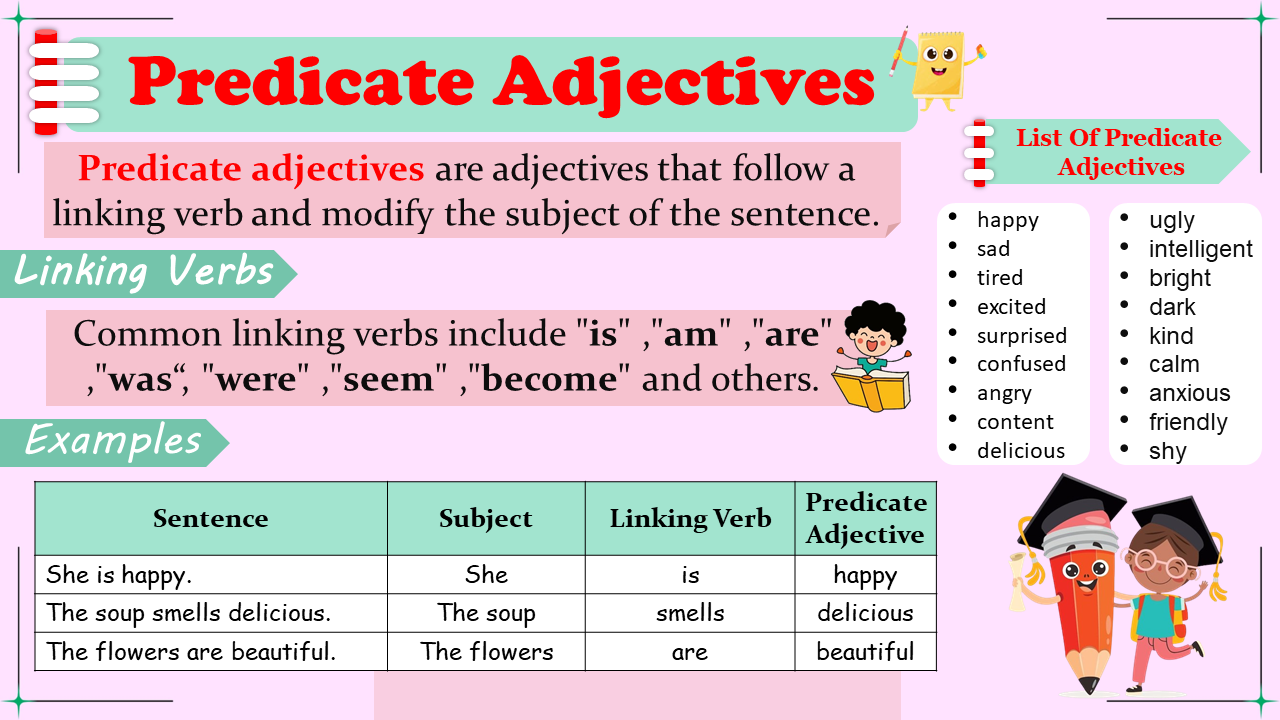
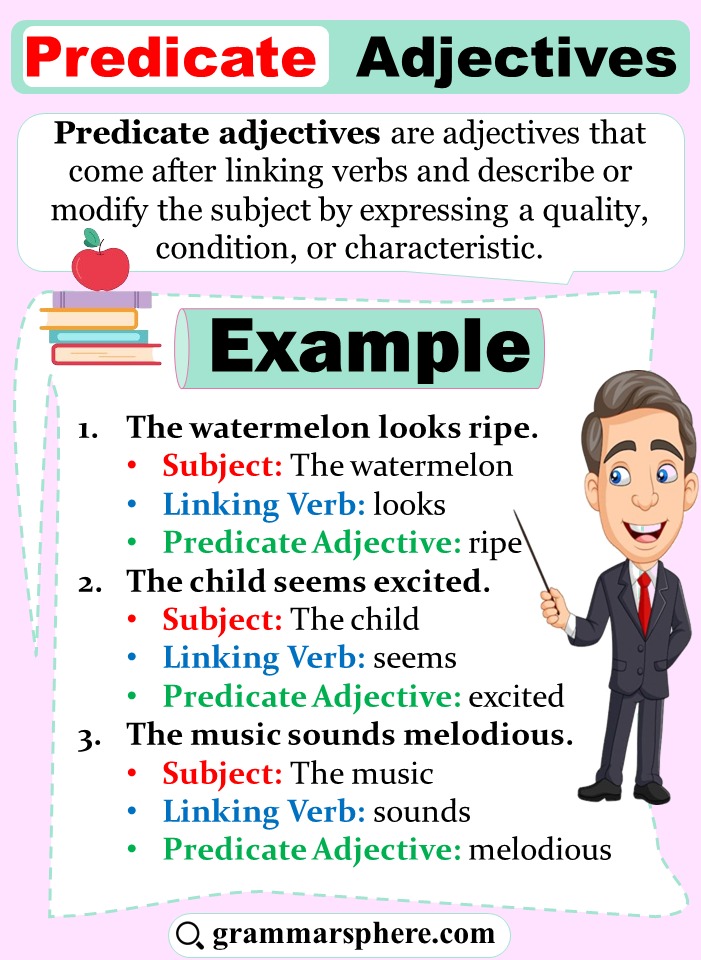
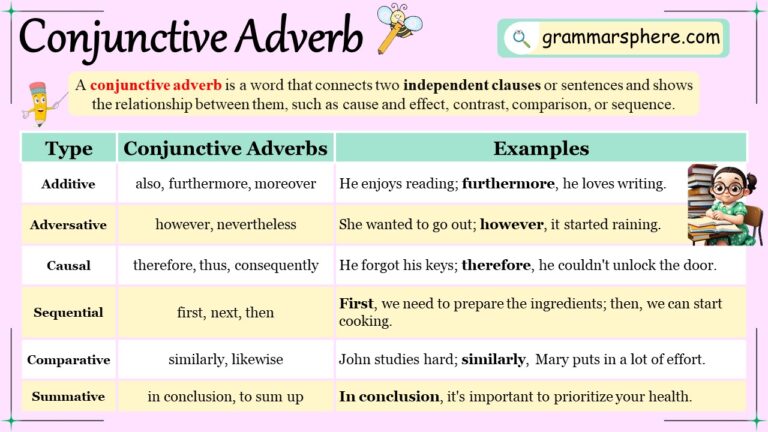
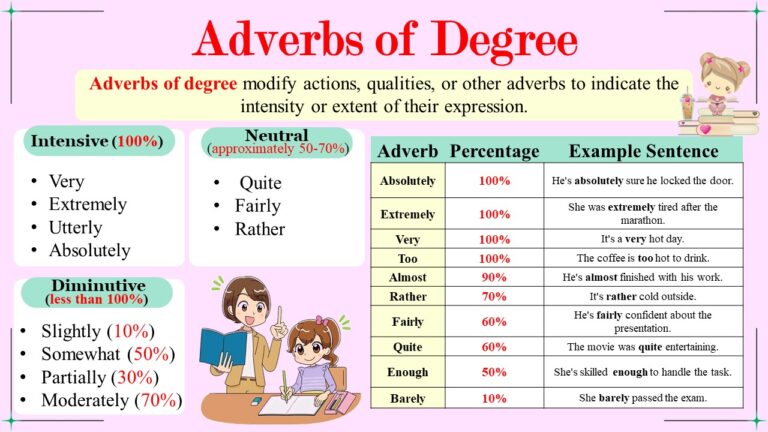
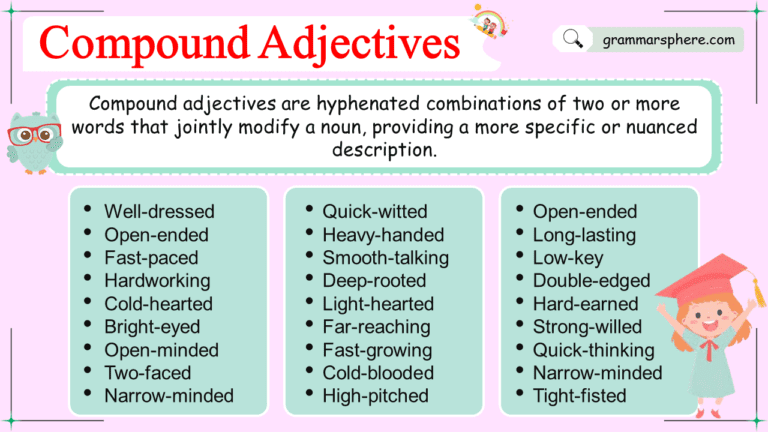
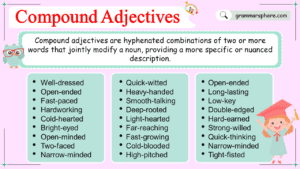
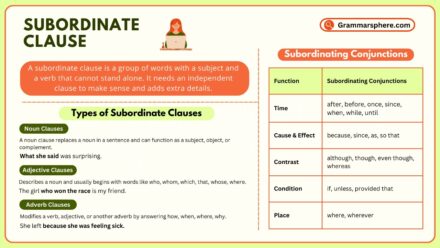
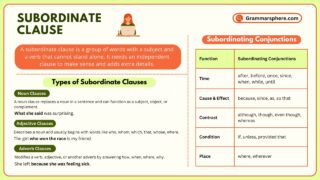
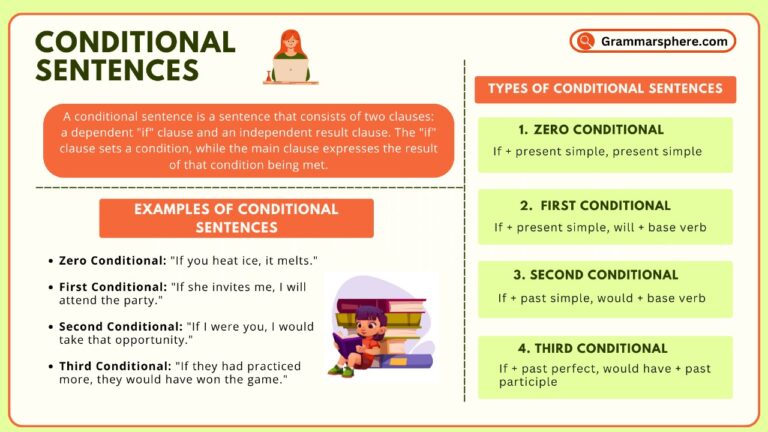
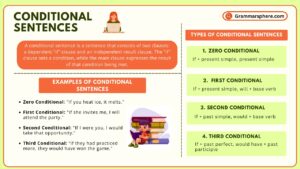
Leave a Comment